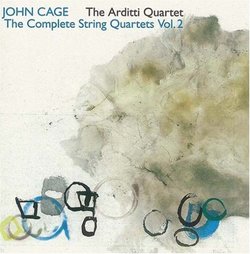| All Artists: John [1] Cage, Arcadian Academy Title: John Cage: The Complete String Quartets, Vol. 2 Members Wishing: 2 Total Copies: 0 Label: Mode Release Date: 3/15/1993 Genre: Classical Styles: Chamber Music, Historical Periods, Classical (c.1770-1830) Number of Discs: 1 SwapaCD Credits: 1 UPC: 764593002727 |
Search - John [1] Cage, Arcadian Academy :: John Cage: The Complete String Quartets, Vol. 2
 | John [1] Cage, Arcadian Academy John Cage: The Complete String Quartets, Vol. 2 Genre: Classical
|
Larger Image |
CD Details |
CD ReviewsCage at his most serene Luke birkla | Leeds, UK | 06/08/2004 (4 out of 5 stars) "Both these works, unlike those of the earlier issue, have a meditative serenity about them; each musical line is "vocal" and lyrical in a unique way. For those who wish to hear music that will shock, provoke, or stir up, turn back. This is, unlike the few works Cage's hallmarks have been falsely tagged to,introspective, subdued music, which challenges the creativity of the ear to listen to the kaleidoscope of colours Cage created. In my opinion, the listener should not focus too intently at first, as the way most listeners perceive music, is from the foundation of their musical traditions. To liberate oneself from this, let the music wash over you, rather than dominate your intellectual capacity. In this way the medidative aspect of the music has its full effect. This is a great cd. It will provoke those who view Cage as an impulsive composer, as the music seems to have no impulse other than the constant iteration of sound and silence. The Arditti's performance is very interesting. Their cohesion, and mode of expression though, is often to intense for this music. The Arditti's tone,although impressive, is too self-aware. All the same this will definitely sooth, and will be a unique cd in your collection." It doesn't hurt! Arthur Hampton | Rohnert Park, CA USA | 05/27/2001 (5 out of 5 stars) "For years I found the mere thought of Cage's music intimidating. I'd heard about the 4 minutes of silence, and some of the prepared piano music, but was unprepared for the simple beauty of these pieces. I hope they re-issue it soon. These wonderful things are easy to grasp and I would go so far as to recommend it as children's music - which is the highest praise, in my opinion." None better, reinvents the genre scarecrow | Chicago, Illinois United States | 01/25/2005 (5 out of 5 stars) "The early String Quartet is a summary work, or one where the musical creativity in other places, as the piano solo music and the prepared piano music transmigrated its way into the strings here. Cage was fascinated by "distributions" of single tones, and two, three, relations of tones, why they should come together or not, and the resulting beauty of this agenda.This is a creative narrative full of surprises,for Cage felt that this "unknown" element should take full centre stage in the proceedings. Each individual string here on the various string instruments is treated is thought through as an entity; an element to its own, materials to be distributed on a sonic grid.This is a grid of harmonics, simply bowed tones, and Cage limits the tones on each, so that it marks out a place, much like the light distributions one finds in light going through a cube, and geometric proportions found there. So the metaphor was to make an entity a situation determinate, yet free in that the cello can and does play the same tones as the violins, but the timbre is indeed slighly transformed. You have then simplistic traditional beauty here,wonderful to simply hear a slowly drawn bow across a string, you can sense the friction of this.The context of this work resides in the after war years,and was a response to the brutal relative ugly music the Europeans were writing as this time, as Boulez's Artaudian "piano sonatas", or Stockhausen's machine like "klavierstuck". The intervals in Cage here suggest this open-ness and you cannot help hearing a little Copland,here his fifths and fourths, from the Appalachia music. But the reference really has no weight of forbearance on what Cage was interested in.
The "Four" as well is from the Eighties, a time when Cage had renewed his interest in the "process" of things, how materials can literally cross each other. Here for example the part from one, say the violoncello part is passed like a racing form to another player for a reading. It is all slow music anyway, but the indeterminate simultaneous interplay is what makes this music fascinating to listen to. Arditti seem to have more here to engage their performative demeanors than the more ugly string quartet music in Volume Two for the Mode Label, the "Thirty Pieces for String Quartet" (1983) half an hour of thorny expressionistic, tumultuous renderings. All the recordings here were (supervised) by Cage. Well Cage was there at this recording place." |

 Track Listings (6) - Disc #1
Track Listings (6) - Disc #1